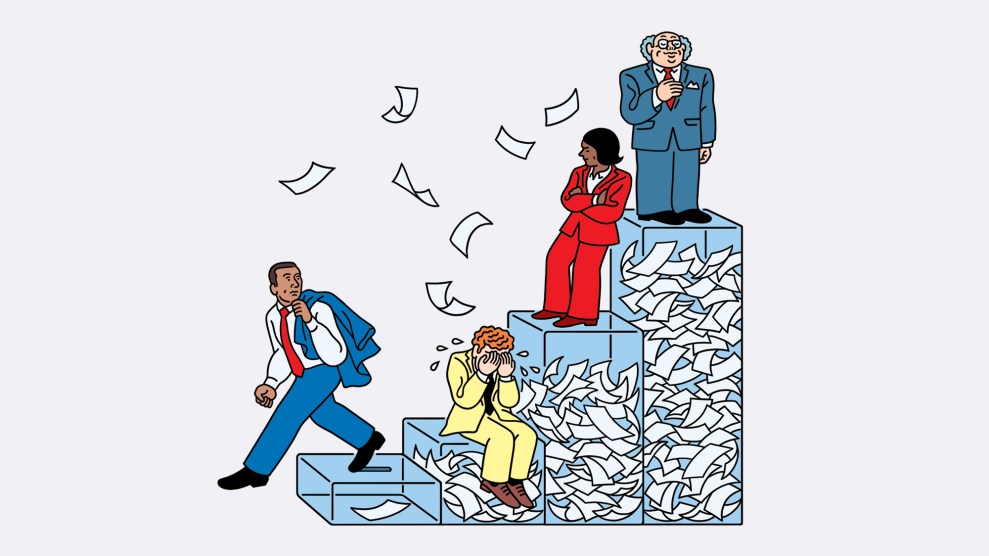It’s been almost a month since Michael O. Leavitt was sworn in as head of the Environmental Protection Agency. His appointment was greeted with howls of protest by environmentalists, and there’s nothing in his short record to date to suggest they misjudged.
On Tuesday, Leavitt, the former governor of Utah, delivered his first speech, laying out his environmental philosophy, which can be summarized as one of locating and occupying “the productive middle ground” between the needs of business and the health of the environment.
A quick review of some of the measures taken since Leavitt has been in office shows that he defines “middle ground” as policies that broadly favor business over the environment, as predicted by environmentalists who saw his appointment as consistent with the Bush administration’s policy of rolling back environmental regulations.
When Leavitt was sworn in, few were optimistic about Leavitt’s prospects to help improve Bush’s dismal record on enviro-issues. Robert F Kennedy Jr, a senior staff attorney at the Natural Resources Defense Council, writes in the recent issue of Rolling Stone:
“Leavitt has a winning personality and a disastrous environmental record. Under his leadership, Utah tied for last as the state with the worst environmental enforcement record and ranked second-worst (behind Texas) for both air quality and toxic releases.”
Leavitt’s gestures toward “balance” in his speech on Tuesday were criticized by environmentalists:
“Environmentalists understand balance, but Leavitt’s balance is not the tending of the delicate interaction between nature and humanity in order to ensure that the ecological systems on which we rely are protected. An examination of the Bush administration’s record during its first three years in office demonstrates that it views its role as reestablishing the preeminent right of corporations to take from nature what they need with little regard for the long-term health of nature or for the communities that live downwind or can’t afford bottled water. The “balance” the administration wishes to strike is akin to an affirmative action program for corporate polluters.”
Here’s a recap of some of the less-than-friendly measures toward the environment that Leavitt has presided over during the last month:
Weakening of the Clean Air Act:
Specifics were lacking from Leavitt’s speech on Tuesday, but Leavitt did focus on the Clean Air Act, saying that the EPA would release a 500-day plan for improving air quality soon. He strongly commended the Act, arguing that its important because it is “by far the best route to better air quality in the most comprehensive manner.”
“Will we be able to accelerate air quality improvement and maintain economic competitiveness without it? The answer is no.”
Many environmentalists would argue differently. In fact, the day Leavitt started his new job, the EPA decided to clear as many as 20 pollution violators under investigation. Modifications by the Bush administration to the original 1970 Clean Air Act, which required oil refineries, power plants to install pollution control technologies, means that many plants now have less responsibility to clean up. Environmentalists say the Bush administration is just caving to big industry. Boulder’s Daily Camera writes on Monday:
“The U.S. Environmental Protection Agency (which increasingly flouts its name) has worked to water down the Clean Air Act rules that restrict the pollutants from power plants. The new rules would exempt some power-plant renovations from “new source review” scrutiny.”
Reducing Standards on Mercury Emissions:
The EPA also recently announced that it was scrapping plans to rein in mercury emissions. Previously, the EPA was on track to issue new rules requiring the nation’s 1,100 coal and oil fired power plants to install equipment to reduce mercury and nickel emissions. Mercury is dangerous because it can enter the food chain and threaten public health, especially for children and pregnant women who eat tainted fish. It causes severe neurological and developmental damage in humans.
On Tuesday, Leavitt confirmed that the EPA is considering reversing a Clinton-era decision that would have forced power plants to reduce levels mercury—of which coal plants currently emit 48 tons a year. Leavitt suggested a mandatory “cap and trade” program which would allow utilities to buy emissions “credits” from cleaner-operating plants to meet an overall industry target. The administration argues that the alternative program will
achieve 70 percent reductions by 2018. But opponents of the measure say it’s far less than the reduction that would have occurred under the old provision. David Hawkins of the Natural Resources Defense Council says:
“It looks as if the administration is going totally in the tank with the utility industry, in a flat-out violation of the law. We know this stuff is bad for kids, but they don’t care.”
Unhealthy Forests
The wildfires in California this November gave Bush an opportunity to push forward the Healthy Forests Restoration Act, a bill he signed on Wednesday. According to the administration, the law will minimize wildfires by thinning forests. The administration says: “The President’s Healthy Forests Initiative is returning the nation’s forests to their natural condition by reducing unnecessary regulatory obstacles that hinder active forest management.”
Environmentalists argue that the initiative offers generous corporate giveaways to loggers and doesn’t protect old growth forests. The law won’t allow citizen reviews before forest thinning begins. Sean Cosgrove, a forests expert with the Sierra Club said:
“The timber industry fought real hard for this bill for a reason and it’s not because they want to remove brush and chaparral. Through and through this thing is about increasing commercial logging with less environmental oversight.”
There’s little surprise in these developments. Bush, after all, has the worst environmental record of any U.S. president, and Leavitt was his hand-picked choice.















